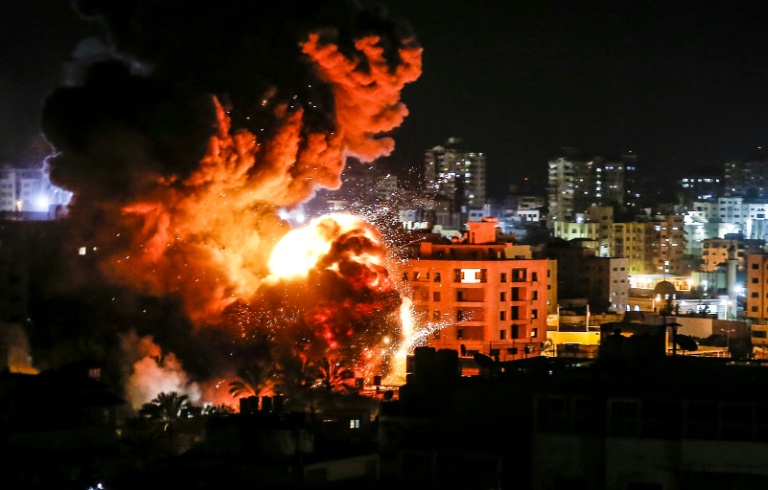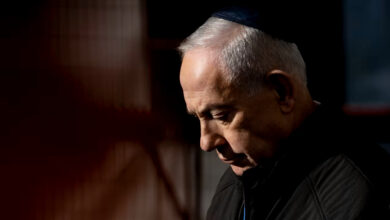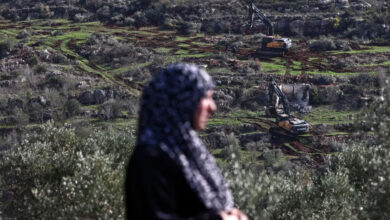
Israel kept up air strikes on Gaza into Tuesday and Palestinian militants launched new rockets despite a reported ceasefire deal, raising fears of a return to open conflict in the enclave.
Gaza’s Islamist rulers, Hamas, had said on Monday evening that an Egypt-brokered ceasefire has been agreed following a flare-up of violence just two weeks before an Israeli general election.
But the Israeli army reported late-night mortar fire and 30 new rocket launches from Gaza, on top of 30 rockets detected earlier in the evening.
Israel struck around 15 fresh targets including what the army said were a Hamas military compound and an Islamic Jihad position, adding in a statement that it would “increase its operational activity as necessary”.
“Our response was very powerful, very very powerful,” Israeli Prime Minister Benjamin Netanyahu told Israeli reporters accompanying him on a visit to Washington.
“Hamas needs to know that we shall not hesitate to go in (to Gaza) and take all necessary steps,” he said in in remarks broadcast on Israeli public radio.”
During the night, an AFP journalist saw multiple rockets fired from the north of Gaza towards Israel.
Some were intercepted by air defenses while others hit uninhabited areas, the Israeli army said.
The ceasefire announcement came after Israeli strikes hit the office of Hamas Ismail Haniya and dozens of other sites across the Gaza Strip on Monday evening.
Those strikes were in response to a rare long-distance rocket attack from the Palestinian enclave that hit a home north of Tel Aviv and wounded seven people early on Monday.
Israel, whose strikes began around the same time Netanyahu met US President Donald Trump in Washington, did not comment on the ceasefire report.
“Egyptian efforts succeeded with a ceasefire between the occupation and the resistance factions,” Hamas spokesman Fawzi Barhoum had said.
Netanyahu, who is also defense minister, boarded a flight back to Israel, cutting short his US visit, and saying that on arrival he would go straight to the defense ministry in Tel Aviv.
On Tuesday, he had been scheduled to address a pro-Israel lobby group and have dinner with Trump.
He is expected to land in Israel around midday (1000 GMT).
Balls of fire
Israel and Hamas have fought three wars since 2008, and Netanyahu is believed to want to avoid another one with unpredictable results ahead of the April 9 election.
But he faces a tough challenge from a centrist political alliance led by former military chief Benny Gantz and came under pressure to respond firmly.
Gaza’s health ministry said Monday evening that seven people had been wounded as explosions rocked the enclave and balls of fire rose into the sky.
There was no indication the Hamas leader was in his office at the time it was hit.
In comments from the White House, Netanyahu said “Israel is responding forcefully to this wanton aggression,” while Trump spoke of Israel’s “right to defend itself”.
One Israeli strike destroyed a building in Gaza City that Israel alleged was a secret Hamas security and intelligence headquarters.
Hamas’s internal security office in Gaza City was also hit.
A joint statement from militant groups in Gaza, including Hamas and Islamic Jihad, took responsibility for the rockets fired later on Monday in response to the Israeli strikes.
Israel’s army said the rocket from Gaza that hit a house early Monday was fired by Hamas.
A Hamas official, speaking to AFP on condition of anonymity, denied the group was behind the rocket, evoking the possibility it was caused by “bad weather”.
The Israeli house hit was located in the community of Mishmeret, around 20 kilometres (12 miles) north of Tel Aviv, police said.
The rocket would have had to travel some 120 kilometres (75 miles) from Rafah in the southern Gaza Strip, where Israel said it was fired from.
The hospital treating the wounded said seven Israelis were injured lightly by burns and shrapnel, including three children.
Protests anniversary
Monday’s rocket attack followed another rare incident on March 14 in which two rockets were fired from Gaza towards Tel Aviv.
They caused no casualties or damage, but Israel responded to the rocket fire by hitting what it said were around 100 Hamas targets across the Gaza Strip.
Four Palestinians were reported wounded in those strikes.
Both Hamas and Islamic Jihad denied they were behind the March 14 rocket fire towards Tel Aviv, raising the possibility it was launched by fringe groups.
The Israeli amry said it was launched by Hamas, but later Israeli media reported the army’s assessment was that the rockets had been fired by mistake during maintenance work.
Saturday marks the first anniversary of mass Palestinian protests along the Gaza border that have drawn a deadly response from the Israeli army.
At least 258 Palestinians have been killed along with two Israeli soldiers.
An informal truce between Hamas and Israel had led to relative calm along the border, but recent weeks have seen another uptick in violence.




